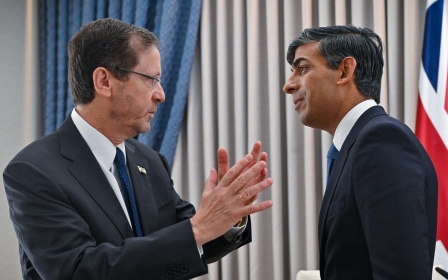Israel-Palestine war: Why the UK Labour Party is no longer a safe home for Muslims

The 16-year Israeli siege of Gaza has escalated to relentless bombing with thousands of casualties. The images of humanitarian catastrophe coming out of Gaza are harrowing and raise deep concerns.
Israeli violations have been made possible, in part, through the diplomatic and vocal support of the British establishment and Labour leader Keir Starmer.
Starmer has unequivocally condemned the killing of Israelis on 7 October, while justifying Israel’s mass targeting of civilians and collective punishment in Gaza. This is a betrayal not only of international law and the historical rights of Palestinians, but also of humanity.
Starmer has failed to apologise for the comments he recently made on LBC, effectively endorsing Israel’s collective punishment and potential war crimes. Coming from a human rights lawyer, this was a slap in the face to every person of justice, regardless of their religion or ethnic identity. Starmer later said his comments were misinterpreted.
His disregard for humanitarian law was echoed on Newsnight by Emily Thornberry, Labour’s shadow attorney general, while David Lammy, the shadow foreign secretary, said Labour “stands with the people of Israel” - without mentioning the need to protect the people of Gaza.
New MEE newsletter: Jerusalem Dispatch
Sign up to get the latest insights and analysis on Israel-Palestine, alongside Turkey Unpacked and other MEE newsletters
The backing of Israeli collective punishment by Labour leadership has left millions of Muslims asking themselves a very troubling question: does Starmer have a problem with Muslims?
The question comes after a 2020 report on Islamophobia by the Labour Muslim Network found 29 percent of Muslim Labour members had suffered Islamophobia within the party, and 37 percent had witnessed it. In addition, 44 percent said Labour did not take Islamophobia seriously.
Different standards
Within weeks of that report, it was revealed that Starmer had received funding for the Labour Party from David Abrahams, whose social media posts have been condemned as Islamophobic.
In 2021, Starmer cancelled an iftar, the breaking of fast in Ramadan, because the organisers supported the boycott of Israeli dates. More than 2,000 people signed a petition, started by Friends of Al-Aqsa, criticising Starmer for holding Muslims to different “standards”.
Follow Middle East Eye's live coverage for the latest on the Israel-Palestine war
A 2022 follow-up report on Islamophobia by the Labour Muslim Network found that 68 percent of Muslim Labour supporters did not trust the Labour leadership to tackle Islamophobia effectively.
After the LBC interview, Starmer’s office issued a “strong” warning against MPs speaking at rallies and protests demanding justice for Palestinians.
Why would the Labour leader call for the release of all hostages to Muslims at an Islamic centre in South Wales?
His stance has raised tensions within the Labour Party, leading to the resignations of councillors, while MPs have ignored the directive of not attending rallies.
Labour has lost Oxford City Council, with eight councillors resigning. And the entire Leicester City Council Labour group, with 31 councillors, has asked all party leaders to call for an immediate ceasefire and an end to the Gaza blockade. The call for a ceasefire is further supported by 250 Muslim councillors.
The sentiments against Labour were highlighted last week by one councillor who warned that the party had “a day or two” left to alter course before the internal situation became “unmanageable”.
Deliberate reductionism
This comment relates to Starmer’s selective application of freedom of speech and rights for those seeking justice for Palestine and British Muslims. His prejudice was highlighted after he visited a mosque in Wales and then posted on social media: “I repeated our calls for all hostages to be released.”
I approached Labour Party for a response but did not hear back by the time of publication.
Why would the Labour leader call for the release of all hostages to Muslims at an Islamic centre in South Wales? Does he hold British Muslims collectively responsible for the actions of those thousands of kilometres away?
This is deliberate reductionism, by which all Palestinians are lumped in with Hamas, a group that is now equated with terrorism - and in turn, all British Muslims and supporters of Palestine are viewed as terrorist sympathisers. Such reductionism discriminates against Muslims and breaches the Labour code of conduct on Islamophobia.
The impact of this kind of reductionism was in action last week, when a Labour MP, Mohammad Yasin, was prevented from boarding a flight to Canada “because his name was Mohammad”.
Islamophobia within Labour has become so rampant that Apsana Begum, the country’s first hijab-wearing Muslim MP, was forced to leave her own party’s conference due to threats against her.
The disquiet around Starmer’s policies is revealed in a large survey conducted by Muslim Census of 30,000 Muslims spread across 575 Parliamentary constituencies. This showed 66 percent drop in support for Labour, meaning if elections were to be held now, only 4.9 of Muslims would vote for the party.
This is a collapse from the 2019 election when 71 percent of Muslim voters supported Labour.
Under Starmer, every aspect of Muslim rights, both nationally and internationally, has been denuded. This failure to treat Muslims on par with other communities has led many to ask whether Starmer has a problem with Muslims - and to conclude that under his leadership, the Labour Party can no longer be the political home of Muslims.
The views expressed in this article belong to the author and do not necessarily reflect the editorial policy of Middle East Eye.
Middle East Eye delivers independent and unrivalled coverage and analysis of the Middle East, North Africa and beyond. To learn more about republishing this content and the associated fees, please fill out this form. More about MEE can be found here.






